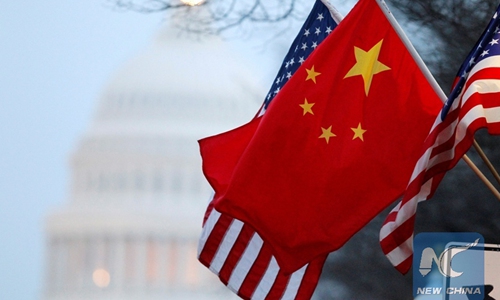US anti-China hawks sanctioned by China keep meddling in various global issues
By GT staff reporters Source: Global Times Published: 2020/7/17 1:37:40

Photo:Xinhua
As the US Secretary of State's attacks on China escalate, some of US politicians are joining Mike Pompeo to push China and the US to the brink of a clear rupture, observers said, saying that anti-China US hawks are not only notorious in China, but also despised by many US progressives, observers said.
China's Foreign Ministry on Monday announced sanctions against the US Congressional-Executive Commission on China, Ambassador at Large for International Religious Freedom Samuel Brownback, US Senators Marco Rubio, Ted Cruz and Republican Representative Chris Smith, following US sanctions on Chinese officials over the Xinjiang issue.
The targeted individuals and groups are seen as the clowns of US politics for their far-right views on domestic affairs and meddling in international issues, said US observers.
Senators Marco Rubio and Ted Cruz are typical backers of recent anti-China campaign led by the US.
Rubio has been involved in a wide range of China-bashing activities including the campaign to block the Chinese tech giant Huawei, promoting the Hong Kong Human Rights and Democracy Act of 2019, opposing American companies' investment in China and calling China for compensation over COVID-19.

US Republican Senator Ted Cruz Photo: IC
Ted Cruz became one of the most prominent disruptive elements for his blatant foreign intervention in Hong Kong affairs. He gained a notorious reputation when he arrived in Hong Kong in October, 2019, wearing a black shirt to mark his solidarity with Hong Kong rioters and support for the radical demonstrations that severely disrupted life in the city for months.
Both Ted Cruz and Marco Rubio are "despised by most young people, working class people, and minorities for their right-wing ideology," Jack Campbell, a US observer focusing on China-US relations , told the Global Times.
The Congressional-Executive Commission on China (CECC) was created by Congress in October 2000 with the legislative mandate to "monitor human rights and the development of the rule of law in China," and to submit an annual report to the President and Congress.
The Commission consists of nine Senators, nine Members of the House of Representatives, and five senior Administration officials appointed by the President.
The CECC, staked with many anti-China senators has issued many reports with weak and even fake evidence criticizing China on issues involving Xinjiang and other religious topics. It invited Rebiya Kadeer, a separatist from Xinjiang who now resides in the US, to a hearing in 2018.
CECC's reports are filled with negative anti-China information that influences other members of Congress, Liu Weidong, a research fellow at the Chinese Academy of Social Sciences' Institute of American Studies, told the Global Times on Thursday.
Congressman Smith of New Jersey is also a veteran anti-China hawk. He proposed a bill in April calling for stripping China of its sovereign immunity and allowing Americans to sue the Chinese government, according to his official website. Other Republicans such as Jim Banks joined the blame game in condemning the Chinese government's handling of the epidemic.
Samuel Dale Brownback, a former US Republican Senator from Kansas is now the US Ambassador at Large for International Religious Freedom (IRF), which was formed after the adoption of International Religious Freedom Act (IRFA) of 1998 and allows the US to meddle in the affairs of other countries in the name of religion.
The ambassador is designated by the US president directly and serves as an advisor for him on religions issues.
Brownback and the IRF office have smeared China on issue related to Xinjiang or Tibet since he was appointed by Trump in 2018. Apart from distorting the facts, the IRF has meddled in other countries through tools such as its annual Report on International Religious Freedom.